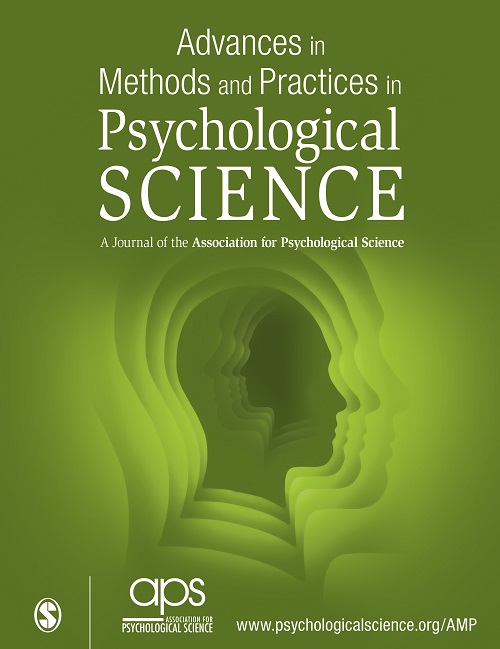Measurement Schmeasurement: Questionable Measurement Practices and How to Avoid Them
IF 15.6
1区 心理学
Q1 PSYCHOLOGY
Advances in Methods and Practices in Psychological Science
Pub Date : 2020-12-01
DOI:10.1177/2515245920952393
引用次数: 314
Abstract
In this article, we define questionable measurement practices (QMPs) as decisions researchers make that raise doubts about the validity of the measures, and ultimately the validity of study conclusions. Doubts arise for a host of reasons, including a lack of transparency, ignorance, negligence, or misrepresentation of the evidence. We describe the scope of the problem and focus on how transparency is a part of the solution. A lack of measurement transparency makes it impossible to evaluate potential threats to internal, external, statistical-conclusion, and construct validity. We demonstrate that psychology is plagued by a measurement schmeasurement attitude: QMPs are common, hide a stunning source of researcher degrees of freedom, and pose a serious threat to cumulative psychological science, but are largely ignored. We address these challenges by providing a set of questions that researchers and consumers of scientific research can consider to identify and avoid QMPs. Transparent answers to these measurement questions promote rigorous research, allow for thorough evaluations of a study’s inferences, and are necessary for meaningful replication studies.测量Schmeasurement:有问题的测量实践和如何避免它们
在这篇文章中,我们将有问题的测量实践(QMP)定义为研究人员做出的对测量的有效性以及最终对研究结论的有效性提出质疑的决定。怀疑产生的原因有很多,包括缺乏透明度、无知、疏忽或对证据的歪曲。我们描述了问题的范围,并重点介绍了透明度如何成为解决方案的一部分。由于缺乏测量透明度,无法评估对内部、外部、统计结论和结构有效性的潜在威胁。我们证明,心理学受到测量和测量态度的困扰:QMP很常见,隐藏了研究人员自由度的惊人来源,并对累积的心理科学构成了严重威胁,但在很大程度上被忽视了。我们通过提供一系列问题来应对这些挑战,科学研究的研究人员和消费者可以考虑这些问题来识别和避免QMP。对这些测量问题的透明回答促进了严格的研究,允许对研究的推论进行彻底的评估,并且对于有意义的复制研究是必要的。
本文章由计算机程序翻译,如有差异,请以英文原文为准。
求助全文
约1分钟内获得全文
求助全文
来源期刊
CiteScore
21.20
自引率
0.70%
发文量
16
期刊介绍:
In 2021, Advances in Methods and Practices in Psychological Science will undergo a transition to become an open access journal. This journal focuses on publishing innovative developments in research methods, practices, and conduct within the field of psychological science. It embraces a wide range of areas and topics and encourages the integration of methodological and analytical questions.
The aim of AMPPS is to bring the latest methodological advances to researchers from various disciplines, even those who are not methodological experts. Therefore, the journal seeks submissions that are accessible to readers with different research interests and that represent the diverse research trends within the field of psychological science.
The types of content that AMPPS welcomes include articles that communicate advancements in methods, practices, and metascience, as well as empirical scientific best practices. Additionally, tutorials, commentaries, and simulation studies on new techniques and research tools are encouraged. The journal also aims to publish papers that bring advances from specialized subfields to a broader audience. Lastly, AMPPS accepts Registered Replication Reports, which focus on replicating important findings from previously published studies.
Overall, the transition of Advances in Methods and Practices in Psychological Science to an open access journal aims to increase accessibility and promote the dissemination of new developments in research methods and practices within the field of psychological science.

 求助内容:
求助内容: 应助结果提醒方式:
应助结果提醒方式:


